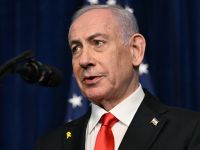France's ambassador in Amman Bernard Emie on Tuesday reviewed the progress in Jordanian-European relations over the year 2000 and gave a positive assessment of the ongoing partnership-building process. Declaring that the European Union remains Jordan's first economic partner, the ambassador highlighted prospects for further strengthening of political ties.
The number and frequency of European officials' visits to Jordan throughout the year — seven in total, not counting the regular trips by the EU special envoy to the Mideast peace process, Miguel Moratinos — “are a testimony to the importance of Jordan to the EU,” Emie said.
Speaking at a press conference to mark the end of the French presidency of the EU — which started on July 1, as the EU presidency rotates every six months among the 15 member-states — the ambassador reviewed the recent achievements vis-à-vis the institutional structure of the Union, its Middle East policy, and bilateral ties with the Kingdom. Sweden is to take over the next presidency on January first.
Official European aid to the Kingdom totaled some 1.4 billion euros over the 1996-1999 period — the first phase of Brussels' financial and economic aid program, best known as MEDA I — to support a political, economic, socio-cultural partnership between the EU and 12 Mediterranean countries, including Jordan.
Collective European aid, Emie said, was 254 million euros under MEDA I, mainly granted for structural readjustment and economic reforms, while bilateral aid was granted by the individual member states at 834 million euros, 281 million euros of which was in 1999 alone. Another 50 million euros were allocated to Jordan under other programs, while loans by the European Investment Bank (EIB) totaled 233 million euros, to fund water, telecommunications, transport, electricity, agricultural and industrial projects.
With a 31.5 percent share of the market, the EU is Jordan's first exporter, the ambassador also said. He noted that Europe is also the biggest investor in the Kingdom: Over the past two years, European companies invested here some $700 million — the biggest single chunk of which resulted from France Telecom's acquisition of a 40 percent stake in Jordan Telecom in January.
The Fourth Euro-Mediterranean Conference held on Nov. 15-16 in Marseilles, France, “was a great success for the Euro-Mediterranean Partnership,” Emie remarked.
Jordan sent a full-fledged delegation led by Foreign Minister Abdul Ilah Khatib to the conference, which aimed to assess progress on the Barcelona Process five years after its launch.
Notwithstanding the boycott of some Arab countries — including Syria and Lebanon, which refused to send delegations to Marseilles in protest against the ongoing Israeli violence against the Palestinians — the conference managed to give further impetus to the Euro-Med partnership, Emie said.
The Marseilles conference announced 13 billion euros in aid packages to the Mediterranean partners for the period 2000-2006. Emie said 5.35 billion euros were allocated for MEDA II, 6.4 billion euros for loans by the EIB over the same period and one billion euros were offered by the EIB from its own funds to contribute to regional projects among the countries of the southern bank of the Mediterranean.
As the highlights of Jordan-European joint initiatives over the year 2000, Emie mentioned the inauguration of a clinic in the Jerash refugee camp in April, and the traditional European Film Festival, which saw this year an attendance of about 5,000 viewers, and whose proceedings were donated to the Royal Medical Services. An exhibition on secondary education in the EU at Yarmouk University and in cooperation with the Jordan University for Science and Technology in July was also another example of cooperation.
A two-day Euro-Mediterranean conference to commemorate the late King Hussein witnessed the participation of scholars and officials from Jordan, Italy, Spain, France, Morocco and Turkey. The conference, held under the patronage of King Abdullah, featured addresses highlighting the late King's contribution to the culture of dialogue and respect for cultural diversity, as a necessary foundation for stability and peace.
On February 7, 2000, on the occasion of the anniversary of the death of King Hussein, the European embassies in Amman also issued a joint statement, Emie recalled. “King Hussein was a man of peace, vision and reconciliation,” the statement said. “With determination and strength, King Hussein was also the very embodiment of the Jordanian nation. The EU, confident in the leadership of His Majesty King Abdullah II, remains, as in the past, beside Jordan. It intends to pursue and enhance, in the political and economic fields, the cooperative ties which unite it to the Jordanian people. They will continue to find in the EU a determined supporter.”
A seminar on intellectual property rights, scheduled for November, has been postponed till the spring of 2001, under the Swedish Presidency, Emie said. The ambassador also offered an overview of the EU policy in the region over the last year, citing the EU declarations since the start of the Al-Aqsa Intifada on Sept. 28, calling for an end to the hostilities and asking Israel to lift the blockade on Palestinian villages and towns.
As for the 11-month Inter-Governmental Conference on institutional reforms within the EU, which ended with the Nice summit this month, it was “aimed to allow an enlarged Europe to function efficiently, effectively and democratically,” Emie said. “The French Presidency has succeeded in extending `enhanced cooperation'... which will allow certain countries to go ahead faster than others on cooperation in some fields,” he said. — ( Jordan Times )
© 2000 Mena Report (www.menareport.com)







